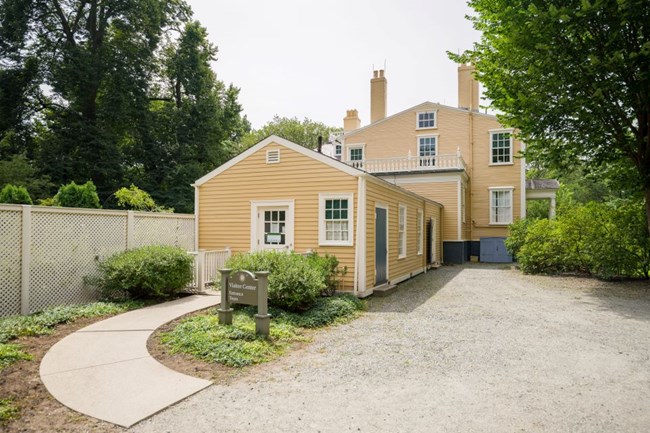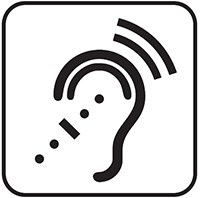|
Longfellow House-Washington’s Headquarters National Historic Site welcomes all visitors. Staff have been trained to help make the site accessible to visitors with physical, sensory, and learning disabilities. The site has accessible parking and a lift to reach the main floor of the historic house. If you have any questions or suggestions of how we can better support you in the future, please let us know! You can contact the site at 617-876-4491 or via email. 
NPS / © Photography Rhode Island James P. Jones Physical / Mobility AccessibilityThe grounds, Visitor Center, and Carriage House of Longfellow House-Washington's Headquarters National Historic Site are wheelchair accessible. The front gate path has several stone steps from street level. The driveway entrance to the left when facing the house provides wheelchair access to the buildings and garden paths. A wheelchair is available to check out from the visitor center desk. Accessible parking spaces are located at the end of the driveway, in front of the Carriage House and next to the visitor center entrance. Accessibility to the first floor of the Vassall-Craigie-Longfellow House for those with limited mobility and/or those in wheelchairs is provided by a lift in the visitor center. House tours require moderate to long periods of standing. Portable stools are available from rangers upon request. The exhibits rooms on the second floor are accessed by a flight of stairs with a multi-level landing at the turn. The steps (ten below the landing, three at the landing, and eight above the landing) are historic, worn, and sometimes uneven. Visitors are asked to use the handrail for stability. The front and back portions of the house are separated by a flight of stairs: eight steps down and eight back up. Photographs of the second floor rooms are available in the visitor center. Our online virtual tour includes the second floor rooms and other spaces not open to the public. A video version is available below. The archives research room does not have accessibility assistance at this time. For research accomodations, please contact the park archivist to make an appointment.

Deaf / Hearing Loss AccessibilityThe National Park service provides qualified American Sign Language interpreters for guided tours. To request an ASL interpreter during your visit, please email us in advance. We recommend contacting us at least 2 weeks before your visit.
Blind / Low Vision AccessibilityThe park brochure is available in several formats designed to increase its accessibility to low vision visitors, including an audio described version. A Braille edition of the park brochure is available by request at the visitor center desk. Park users can access the audio described brochure - along with all National Park Service brochures created by the UniD project - by downloading the free UniDescription mobile app, which has been designed to be the most efficient and effective method for accessing the audio-description material. The UniDescription app is available in Google Play for Android or the Apple App Store for iOS. If you prefer, download a folder of audio Mp3 files. The NPS App offers accessibility tools including audio descriptions of places around the house and grounds. All tours of the house are led by rangers, who can provide visual descriptions of the rooms and objects. Service AnimalsIn national parks, service animals are permitted anywhere that visitors can go. Service animal policies at Longfellow House-Washington's Headquarters NHS correspond with national guidelines:
For information on animals that do not qualify as service animals, please see our information on pets in the park. Quiet Spaces & TimesTours are typically smaller, quieter groups on weekday mornings. Weekend afternoons in summer are often very busy, and the visiitor center can be crowded and noisy. Tour groups are limited to ten people, but this can feel crowded in hallways and when staying on designated carpet runners to protect the historic collections. Group tours may be scheduled with advance notice. There are limited opportunities for movement in the house, and to preserve the collections, touching furniture and objects is not allowed in the house. Visitors in the house must be accompanied by a ranger. Rangers are happy to assist visitors in returning to the visitor center if they need to leave the tour for any reason. Tactile opportunities are available in the visitor center and outside: check the events calendar for hands-on activities with a ranger, or ask for an activity bag at the visitor center desk. The East Lawn and forecourt are great spaces to run and move The formal garden has some shaded benches that can be quiet spots to take a break. A sensory map of the house and landscape is available in the visitor center. |
Last updated: September 4, 2023

